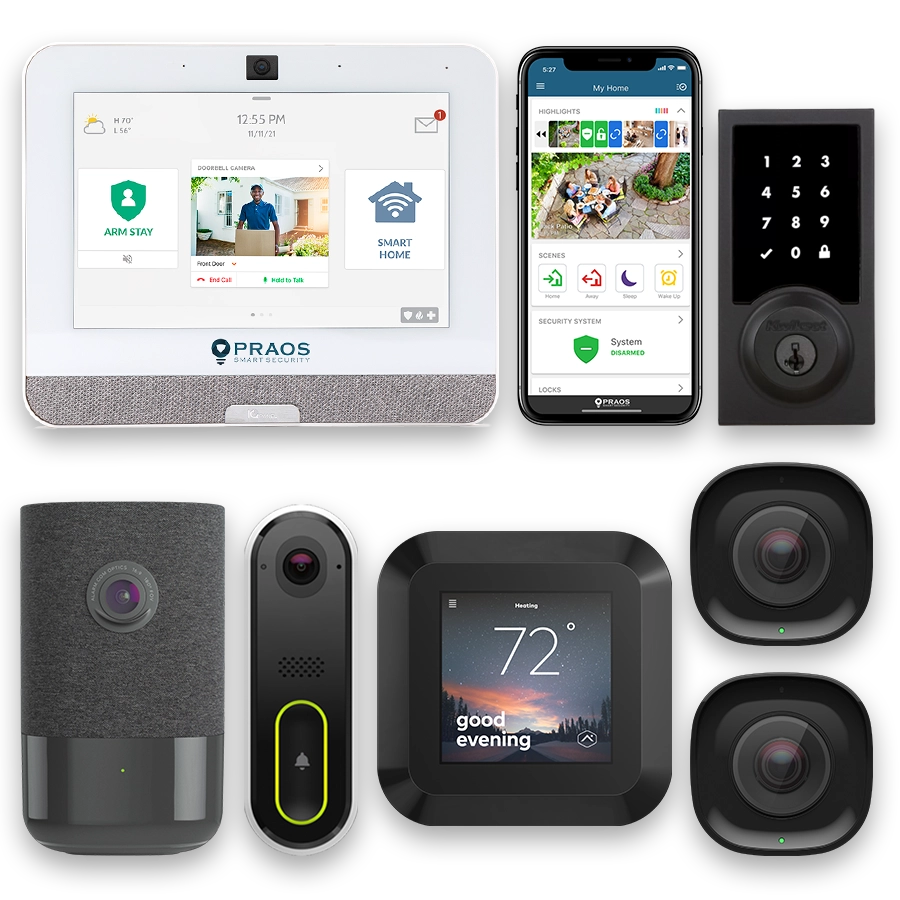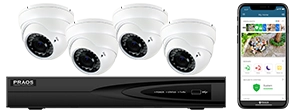Introduction: The Trend of Smart Security Systems in Richmond
In recent years, the adoption of smart security systems by homeowners in Richmond has seen a significant rise. This trend is fueled by advancements in technology and increasing concerns over home security. As intelligent home security solutions become more accessible and affordable, Richmond’s residents are increasingly opting for these systems to protect their homes and families.
According to a report by MarketsandMarkets, the global smart home market is expected to grow from $78.3 billion in 2020 to $135.3 billion by 2025, at a compound annual growth rate (CAGR) of 11.6%. This global trend is reflected locally, with the Richmond area’s market experiencing similar growth in smart security system adoption.
The demand for smart security systems is driven by the desire for enhanced security, convenience, and peace of mind. Traditional security systems, which typically relied on wired connections and basic alarm triggers, are being replaced by more sophisticated smart systems. These modern systems incorporate a range of features such as remote monitoring, real-time alerts, and integration with other smart home devices.
Richmond’s homeowners are also influenced by the increased effectiveness of smart security systems compared to their traditional counterparts. For example, many smart systems offer high-definition video surveillance, intelligent motion detection, and the ability for users to control their security settings via smartphone apps. Such features provide an added layer of security and convenience.
A survey conducted by the Pew Research Center found that 57% of Americans believe that smart home technology is beneficial, highlighting a broad societal shift towards acceptance and adoption of these innovations. Furthermore, smart security systems often come with user-friendly interfaces, making them accessible even to those who may not be technologically savvy.
The Richmond Police Department’s statistics on local crime have also contributed to the rising interest in smart security systems. While crime rates fluctuate, the desire for a proactive approach to home security remains constant. Homeowners in Richmond, aware of both the advantages and the current technological climate, are thus more inclined to invest in smart security solutions.
The growing trend of smart security system adoption in Richmond can be attributed to several key factors. These include technological advancements, increased concerns over security, and the shift in consumer behavior towards embracing smart home innovations. As these systems become more prevalent, Richmond homeowners can expect continued improvements in home safety and security.
The Evolution of Home Security Technology
Home security technology has come a long way from traditional locks and alarm systems. The evolution of home security can be categorized into several distinct phases, each marked by significant advancements.
Early Mechanical and Analog Systems
The earliest home security systems were purely mechanical, such as simple locks and window bars. In the mid-20th century, analog systems like burglar alarms connected to local authorities emerged. These systems were effective but limited in scope and functionality.
Digital and Electronic Advancements
In the late 20th and early 21st centuries, digital technology began to play a vital role in home security. The introduction of CCTV cameras and motion detectors allowed for more comprehensive monitoring. These systems, however, still required significant manual intervention and monitoring by homeowners or security companies.
The Rise of Wireless Technology
The advent of wireless technology brought about significant changes. Wireless sensors and cameras eliminated the need for complex wiring, making it easier to install and expand security systems. These devices also started to feature better integration with other home automation technologies.
Integration with Smart Home Ecosystems
The most recent phase in the evolution of home security technology involves smart security systems. These systems are integrated with broader smart home ecosystems and can be controlled via smartphones, tablets, and voice assistants. They offer a range of features designed to enhance security, convenience, and user engagement.
Major Milestones in Home Security Technology
| Time Period | Key Technologies |
|---|---|
| Early 20th Century | Mechanical locks, Window bars |
| Mid-20th Century | Burglar alarms, Local authority connections |
| Late 20th Century | Digital CCTV, Motion detectors |
| Early 21st Century | Wireless sensors, Home automation |
| Current Era | Smart security systems, Smartphone and voice control |
Key Innovations
- Surveillance Cameras: Advanced from low-resolution analog systems to high-definition digital and IP cameras.
- Motion Detection: From basic infrared sensors to intelligent systems that differentiate between humans and pets.
- Smart Locks: Integration with mobile devices for remote access and control.
- Artificial Intelligence: Enhancing system accuracy and reducing false alarms through machine learning.
This relentless evolution has made modern smart security systems more reliable, efficient, and user-friendly than their predecessors.
Key Features and Benefits of Smart Security Systems
Smart security systems in Richmond have gained popularity due to a host of advanced features and significant benefits they offer to homeowners. These systems provide a wide range of functionalities that enhance security and convenience. The key features and their associated benefits are outlined below.
Remote Monitoring and Control
One of the most notable features of smart security systems is remote monitoring and control. Homeowners can access live feeds and control their security devices from anywhere using a smartphone app. This allows for real-time surveillance and immediate response to any security alerts, providing peace of mind whether at home or away.
Integration with Other Smart Devices
Smart security systems can integrate seamlessly with other smart home devices such as smart locks, lights, and thermostats. This interoperability allows for synchronized actions, such as turning on lights when motion is detected or locking doors automatically when the system is armed, thereby enhancing overall security and energy efficiency.
AI and Advanced Detection Techniques
Modern systems use Artificial Intelligence (AI) and machine learning to distinguish between different types of movements, reducing false alarms triggered by pets or passing vehicles. They can also recognize familiar faces versus strangers, adding an extra layer of personalized security.
24/7 Professional Monitoring
Many smart security systems offer 24/7 professional monitoring services. In case of a security breach, the monitoring center can notify the police or emergency services instantly, ensuring prompt response. This professional oversight provides an additional sense of security for homeowners.
Enhanced Data Security
Data security is a crucial element of smart security systems. These systems employ end-to-end encryption and secure cloud storage for video and data. Strong security measures help protect against cyber threats, ensuring that homeowners’ privacy and data integrity are maintained.
Customization and Scalability
Smart security systems are highly customizable to meet individual needs. Homeowners can start with a basic package and add more devices later as needed. This scalability makes it an attractive option for different types of properties and varying security requirements.
Table of Key Features and Benefits
| Feature | Benefit |
|---|---|
| Remote Monitoring and Control | Real-time surveillance and control from anywhere |
| Integration with Smart Devices | Enhanced security and energy efficiency |
| AI and Advanced Detection | Reduced false alarms and personalized security |
| 24/7 Professional Monitoring | Instant notification to emergency services |
| Enhanced Data Security | Protection against cyber threats |
| Customization and Scalability | Flexible to meet varying needs |
These features and benefits illustrate why smart security systems are an increasingly popular choice for homeowners in Richmond, providing comprehensive security solutions tailored to modern lifestyle needs.
Richmond Crime Statistics and Home Safety Concerns
According to recent data, Richmond, Virginia, has experienced a range of crime incidents that have contributed to a growing concern for home safety among its residents. The Richmond Police Department’s 2022 Annual Report indicates a notable presence of property crimes, including burglary, larceny, and motor vehicle theft. These statistics have driven many homeowners to seek enhanced security measures to protect their properties and loved ones.
Property Crime Rates
In 2022, Richmond reported a total of approximately 11,000 property crime incidents. Burglary accounted for around 1,500 of these incidents, while larceny and motor vehicle theft constituted the majority. Homeowners in neighborhoods with higher rates of these crimes are particularly motivated to invest in advanced security systems to deter potential offenders.
Burglaries
The risk of burglary remains a significant concern for Richmond’s residents. The city’s burglary rate of around 400 incidents per 100,000 people is a critical factor prompting homeowners to upgrade their home security. Smart security systems offer real-time alerts and remote monitoring, providing a sense of security and an effective deterrent against potential burglaries.
Larceny
Larceny, or theft of personal property without breaking and entering, is another prevalent issue. Ranking among the most common property crimes in Richmond, larceny affects thousands of residents each year. Smart security systems, equipped with motion detection and video surveillance, help to reduce the incidence of such crimes by enabling homeowners to monitor their premises closely.
Motor Vehicle Theft
Motor vehicle theft is also a significant concern, with Richmond recording over 1,200 incidents in 2022. Homeowners are turning to smart security systems with features like driveway cameras and vehicle tracking to protect their vehicles from theft.
The Fear of Crime
Beyond the actual crime rates, the perception and fear of crime play a substantial role in influencing homeowners’ decisions. Research shows that even when actual crime rates decrease, the fear of crime can persist, driving homeowners to seek extra precautions. Smart security systems address these concerns by providing a heightened sense of control and safety.
Impact on Insurance Premiums
Another objective reason Richmond homeowners are switching to smart security is the potential impact on home insurance premiums. Insurance companies often offer discounts to homeowners who install advanced security systems. By leveraging these discounts, residents can potentially offset some of the costs associated with purchasing and maintaining these systems.
The combination of real crime statistics and the psychological impact of perceived threats underscores the growing adoption of smart security systems in Richmond. As technology continues to evolve, these systems will likely become an even more integral part of home safety strategies, addressing both tangible and intangible concerns of homeowners.
Consumer Behavior: Why Richmond Homeowners Are Adopting Smart Security
Understanding why Richmond homeowners are increasingly adopting smart security systems involves examining several key factors related to consumer behavior. Rising concerns about home safety, the desire for convenience, advancements in technology, and cost considerations are significant drivers in this trend.
Increased Safety Concerns
Safety concerns are a primary motivator for homeowners. Data from the Richmond Police Department shows a consistent level of property crimes, prompting residents to seek more effective security solutions. Smart security systems offer real-time alerts, remote monitoring, and automated emergency responses, providing homeowners with a heightened sense of security.
Technological Advancements
Advances in technology have made smart security systems more sophisticated and user-friendly. Features such as high-definition cameras, motion sensors, and AI-powered analytics provide comprehensive coverage and incident detection. The integration with other smart home devices allows seamless control through mobile apps, enhancing the overall user experience.
Convenience and Control
Modern consumers prioritize convenience and control in their daily lives. Smart security systems allow homeowners to monitor their property remotely, receive instant notifications, and manage their system from anywhere in the world. This level of control is particularly appealing to tech-savvy individuals and busy professionals.
Cost Considerations
While the initial investment in smart security systems can be higher compared to traditional systems, long-term benefits can outweigh the costs. Benefits include lower insurance premiums and reduced risk of burglary-related losses. Bulk purchase discounts, seasonal sales, and financing options have made these systems more accessible to a broader demographic in Richmond.
Influence of Social Proof
Social proof also plays a role in the adoption of smart security systems. Positive reviews and recommendations from friends, family, and neighbors contribute to an individual’s decision-making process. Seeing the benefits firsthand in a neighbor’s system can be persuasive.
In summary, the adoption of smart security systems in Richmond is driven by a combination of safety concerns, technological advancements, the need for convenience, cost considerations, and social influences. As these factors continue to evolve, it is likely that the trend will persist, further integrating smart technology into the fabric of home security.
Local Government and Community Initiatives
Local government and community initiatives play a pivotal role in the adoption of smart security systems among homeowners in Richmond. Various programs and measures have been implemented to support this technological shift.
Government Subsidies and Incentives
The city of Richmond has introduced several subsidies and incentives aimed at encouraging the installation of smart security systems. For instance, the Richmond Municipal Council offers rebates on property taxes for homeowners who install certified smart security devices. This initiative not only reduces the financial burden on residents but also promotes a safer community.
Educational Campaigns
Educational campaigns have been launched to inform residents about the advantages of smart security technology. These campaigns include public seminars, workshops, and informational brochures distributed through various channels. The focus is to educate residents on how these systems can enhance their personal safety and property protection.
Partnerships with Security Providers
The local government has also formed partnerships with leading security providers. These collaborations have led to discounted rates for installation and maintenance services, making smart security systems more accessible to a broader segment of the population.
Community Safety Programs
Community safety programs, such as neighborhood watch groups, have integrated smart security systems into their operations. These systems allow for faster communication and coordination among residents and local law enforcement, improving the overall efficacy of these programs.
Public-Private Collaborations
Richmond’s government has collaborated with private tech firms to pilot new security technologies in public spaces. These initiatives serve as a testing ground for cutting-edge security solutions, providing valuable data and insights that inform broader community safety strategies.
In conclusion, local government and community initiatives in Richmond significantly support the adoption of smart security systems. Through financial incentives, educational efforts, strategic partnerships, and community programs, these measures collectively enhance the safety and security of Richmond’s neighborhoods.
Cost Analysis and Economic Impact
The cost of adopting smart security systems can vary significantly based on several factors, including the complexity of the system, the specific technologies employed, and the provider. Understanding these costs, as well as the broader economic impact on homeowners and the local economy, is essential.
Initial Investment and Monthly Fees
Smart security systems typically involve an initial investment ranging from purchasing the hardware to installation costs. The initial investment can be broken down as follows:
- Equipment Costs: According to Consumer Reports, the average cost of intelligent security hardware, including cameras, sensors, and control panels, ranges from $200 to $1,000.
- Installation Fees: Professional installation usually adds another $100 to $300, depending on the complexity.
- Monthly Monitoring Fees: Optional professional monitoring services cost between $10 and $50 monthly.
To provide a clearer picture, here’s a table summarizing the average costs:
| Cost Component | Average Price Range (USD) |
|---|---|
| Equipment | $200 – $1,000 |
| Installation | $100 – $300 |
| Monthly Monitoring | $10 – $50 |
Long-term Savings and Insurance Discounts
Although the initial costs can be substantial, many homeowners can realize savings over the long term. For instance, many insurance companies offer discounts for homes equipped with smart security systems. According to data from the Insurance Information Institute, policyholders can save between 5% and 20% on their homeowner’s insurance premiums by installing these systems.
Economic Impact
Beyond individual savings, there are broader economic impacts to consider. The increasing adoption of smart security systems in Richmond contributes to the local economy. Several companies in Richmond offer these systems, supporting local jobs and generating tax revenue. Additionally, the decrease in crime rates due to enhanced home security can reduce the overall strain on local law enforcement and the judicial system.
Cost Comparison with Traditional Systems
When comparing smart security systems with traditional security systems, the costs can be a balancing act. Traditional systems, often involving wired connections and outdated technology, may require less initial investment but lack the advanced features and flexibility of smart systems. On the other hand, intelligent systems, while more expensive upfront, offer features such as remote monitoring, automation, and better integration with other smart home devices, providing additional value.
In summary, while the cost of smart security systems can be significant, the benefits often outweigh the initial investments, considering potential insurance savings and the broader economic advantages.
Future Trends in Smart Home Security Systems and Their Implications
Smart home security systems are rapidly evolving, driven by advances in technology and growing consumer demand. The future trends in this sector are poised to further change the way homeowners in Richmond, and elsewhere, protect their properties.
One of the key future trends is the integration of Artificial Intelligence (AI) and Machine Learning (ML). These technologies are expected to enhance the capabilities of smart security systems by enabling more accurate threat detection and reducing false alarms. For instance, AI can be trained to differentiate between a falling tree branch and a potential intruder, resulting in a more efficient and reliable security system.
Another trend is the increasing popularity of the Internet of Things (IoT). Smart devices can now communicate with each other, creating a more cohesive and comprehensive security network. For example, smart cameras, doorbells, locks, and even lighting systems can work together to provide a more integrated approach to home security.
5G technology is also set to impact smart home security systems significantly. With faster and more reliable internet connections, these systems can offer real-time monitoring and quicker response times. Currently, the deployment of 5G is expanding, and its potential to improve the performance of smart security devices is notable.
Biometric verification is another area of growth. Systems that utilize facial recognition or fingerprint scanning add another layer of security and convenience for homeowners. This technology is already becoming more affordable and accessible, promising further adoption in the coming years.
Moreover, cybersecurity is becoming an increasingly critical component of smart home security systems. As these systems become more interconnected, the potential for cyber-attacks also rises. Companies are investing heavily in developing more secure systems to protect against these threats.
| Trend | Implication |
|---|---|
| AI and ML | Enhanced threat detection, reduced false alarms |
| IoT Integration | More cohesive and comprehensive security network |
| 5G Technology | Improved real-time monitoring and response times |
| Biometric Verification | Additional layer of security and convenience |
| Cybersecurity | Protection against cyber-attacks |
In conclusion, the future of smart home security systems looks promising with advancements in AI, IoT, 5G, biometric verification, and cybersecurity. These trends are likely to make home security systems more sophisticated, efficient, and secure, providing better protection for homeowners.






